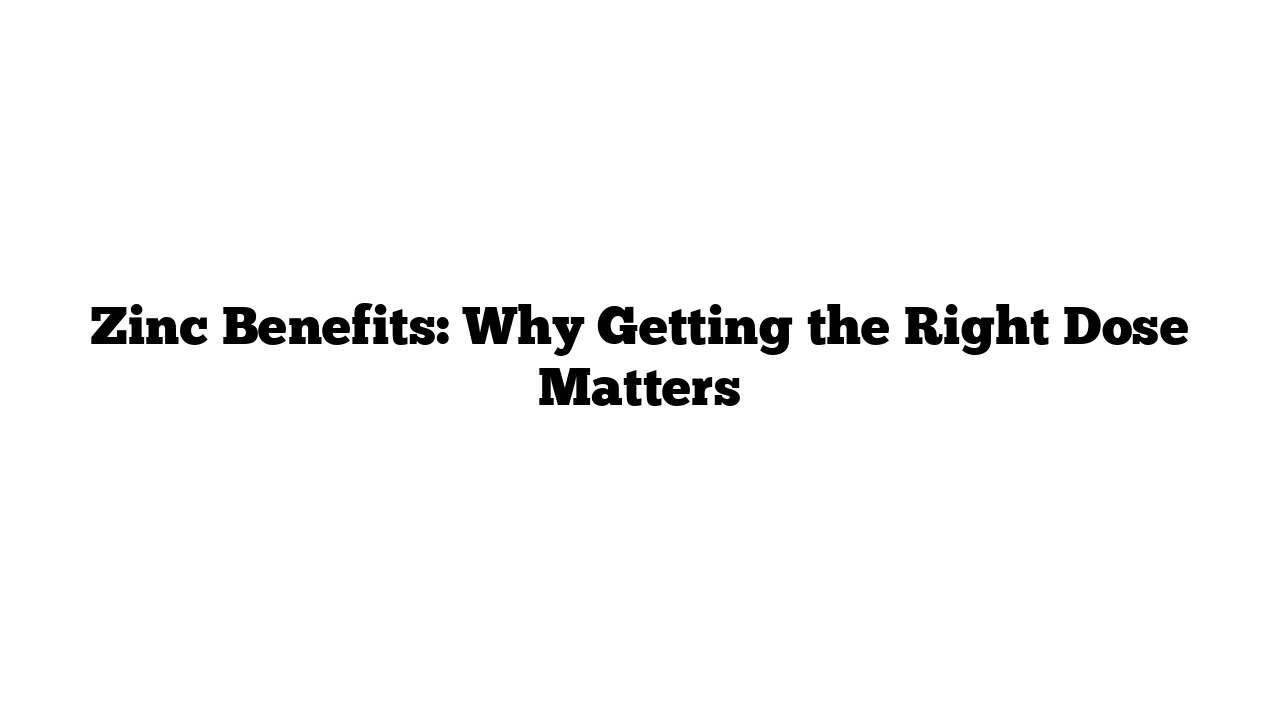When it comes to maintaining health, zinc often gets overlooked. This essential trace mineral plays a vital role in everything from immune function to wound healing. With about 17% of the global population at risk of low zinc intake—especially older adults—there’s growing interest in zinc supplements, particularly during times when immune health is top-of-mind.
Zinc is required for nearly 100 different enzymes in the body, supporting essential processes like protein building, DNA synthesis, and cell division. Since the body can’t store zinc, daily intake is crucial. Here’s an overview of the health benefits of zinc, dosage considerations, and what the science says.
The Importance of Zinc for Immune Health
Zinc and the Common Cold
Zinc supplements have shown promising results in reducing the duration of common cold symptoms. A 2015 Cochrane Review specifically evaluated zinc’s role in immune response, finding that it not only shortened cold symptoms in healthy individuals but also appeared to reduce the overall risk of getting a cold.
In a 2021 review by the British Medical Journal, results from 28 randomized controlled trials (including over 5,000 participants) showed that zinc supplementation led to fewer cold symptoms, with recovery times shortened by about two days. However, the evidence has its limitations—small studies and some bias in the data indicate that further research is needed.
A Word of Caution on Zinc Nasal Sprays
In 2009, the FDA warned against using zinc nasal sprays due to risks of permanent smell loss. If you’re considering zinc supplements, it’s safest to stick to oral forms, such as tablets or lozenges.
Eye Health and Age-Related Macular Degeneration (AMD)
Zinc is also beneficial for eye health. A 2017 Cochrane Review examined its role in age-related macular degeneration (AMD), a condition that can impair vision. This review showed that taking zinc along with other antioxidant vitamins might help slow the progression of AMD. While the evidence is moderate, it’s promising for those at risk of this common age-related condition.
Zinc Deficiency and Its Impact on Health
Zinc deficiency can lead to a range of health issues, including:
- Immune dysfunction: Increased susceptibility to infections
- Impaired wound healing
- Hair loss and baldness
- Night blindness
- Decreased sperm health and potential fertility issues
Older adults, in particular, often have zinc intakes that fall below 50% of the recommended daily amount. Vegetarians may also be at risk because vegetarian diets tend to be lower in zinc bioavailability compared to diets that include meat. This is due to phytates in legumes and whole grains, which bind to zinc and hinder absorption.
Getting the Right Dose: How Much Zinc Do You Need?
The recommended daily intake of zinc is:
- 11 mg for men
- 8 mg for women
Food sources of zinc include oysters, beef, fortified cereals, chicken, cashews, chickpeas, and almonds. However, getting adequate zinc from diet alone can be tricky, especially for vegetarians and older adults.
Supplementing with Zinc: How Much is Enough?
A strategy called micro-dosing can help you maintain the ideal daily intake of zinc without overdoing it. High doses of zinc can interfere with copper absorption, potentially leading to copper deficiency and associated anemia.
Different forms of zinc are available in supplements, such as zinc gluconate and zinc sulfate. The amount of elemental zinc (the actual zinc content) varies, so always check the label. For instance, a 20 mg zinc supplement may contain only about 8.4 mg of elemental zinc.
A Balanced Approach to Zinc Supplementation
For those concerned about copper levels, taking zinc in small doses is a safe way to meet daily requirements without risking copper deficiency. A daily supplement with about 15 mg of elemental zinc should be enough for most people.
Other Potential Benefits of Zinc
- Type 2 Diabetes: Some studies, including a 2015 Cochrane Review, have explored zinc’s role in blood sugar control, but evidence remains inconclusive.
- Cognitive Health: Zinc may also play a role in cognitive function. However, a 2018 Cochrane Review found no substantial benefits for preventing cognitive impairment.
Whether you choose to rely on food sources or supplement your zinc intake, remember that balance is key. Excessive supplementation can lead to unintended health issues, so sticking to daily recommendations is essential.
If you’re looking for reliable zinc products or need more guidance on zinc supplementation, check out medicaltimes.io for up-to-date information and trusted resources.
